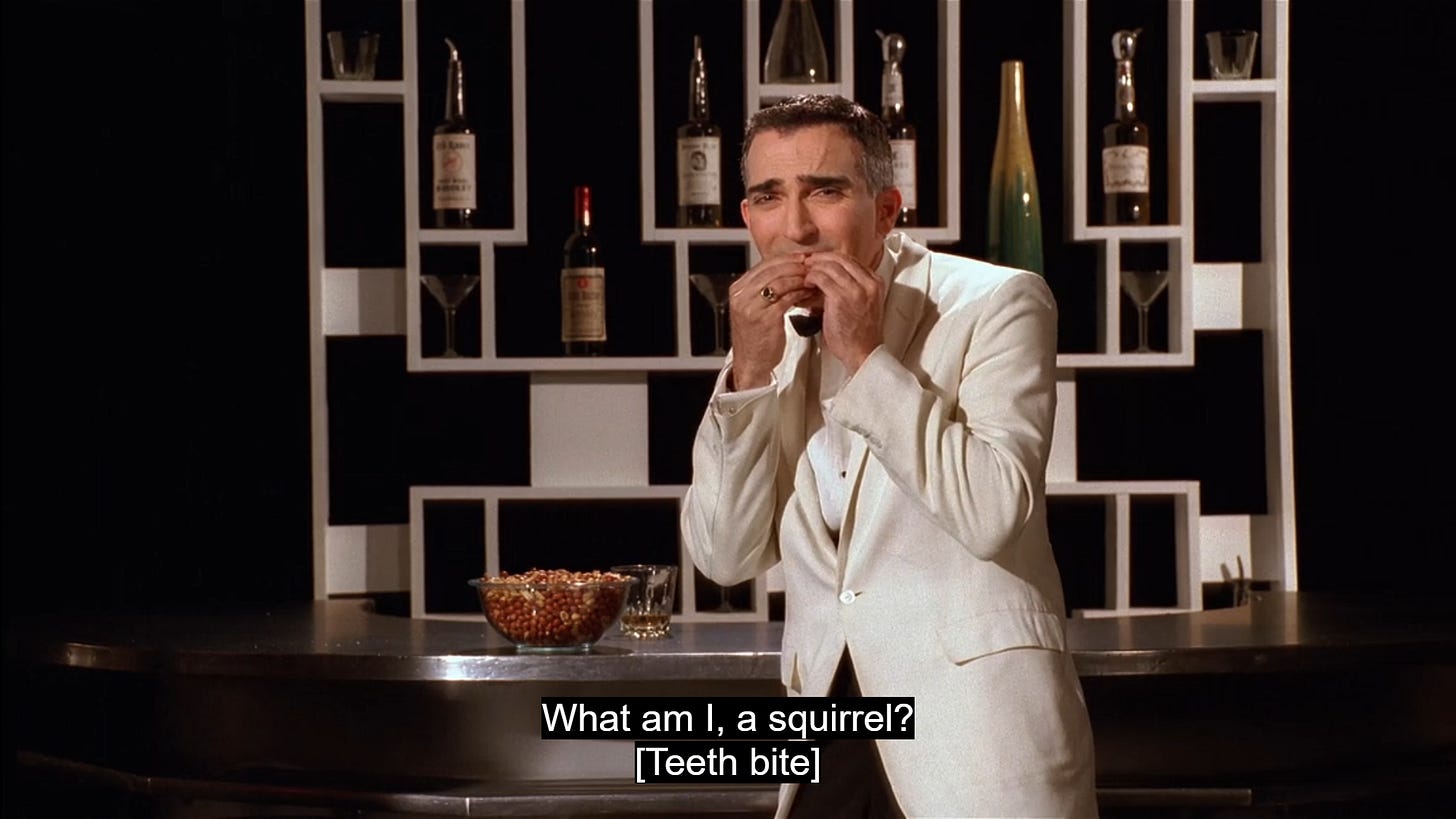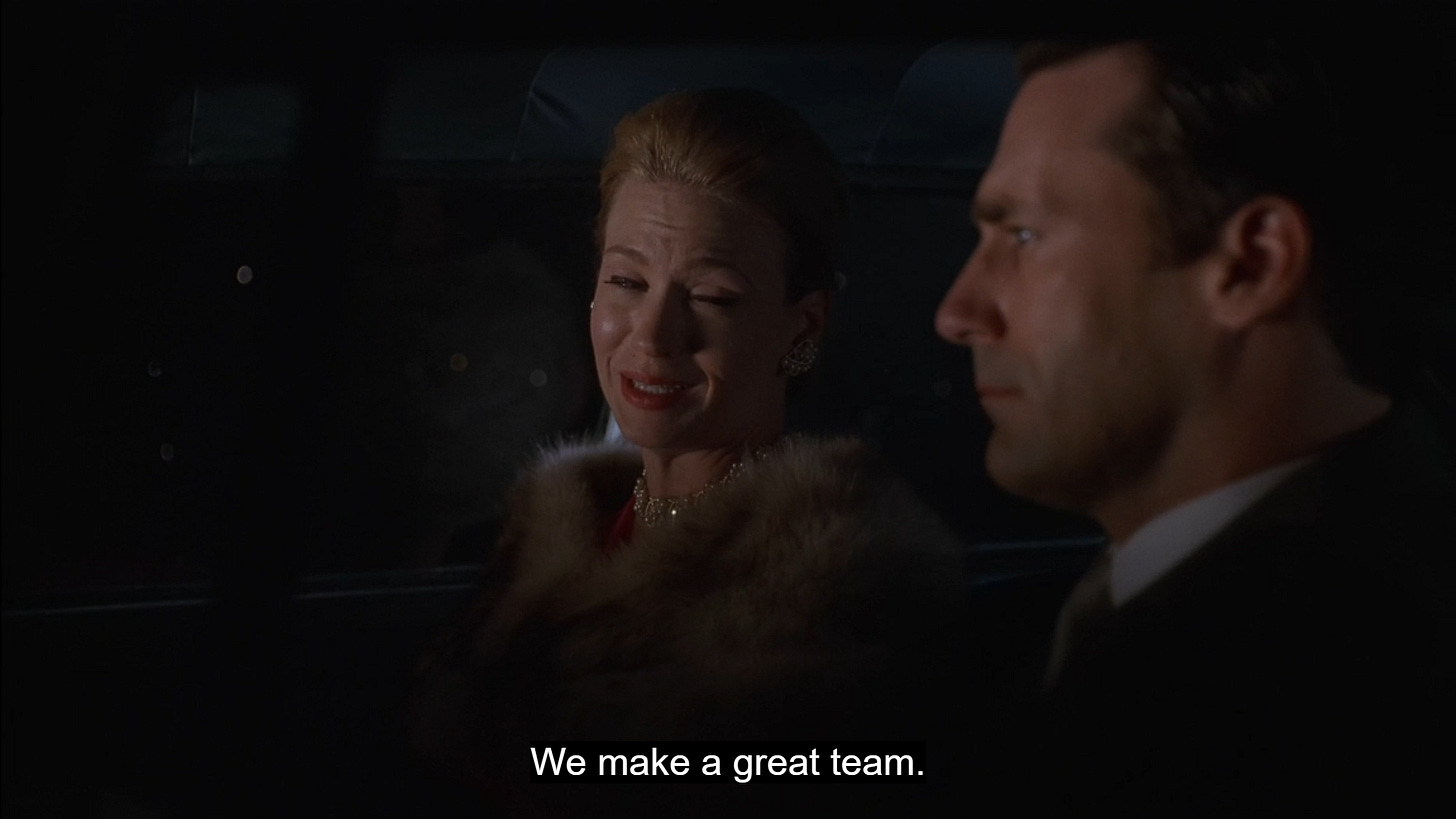Season 2: Episode 3
“The Benefactor”
Written by Matthew Weiner & Rick Cleveland
Directed by Lesli Linka Glatter
Setting: March or April 1962
Firstly, my apologies that this post is coming later than Friday. You can never plan when your sink will explode and your good friend Don Draper isn’t always there to fix it while you write an episode recap.
“The Benefactor” is an episode that makes it easier to explain why season 2 is my least favorite season of the show (which, again, I still think is quite good). Each season has characters that come and go, the prior episode “Flight One” had a season one neighbor of Don’s return and I realized he was a returning character only because he was wearing a fat suit to show that time had passed. They would have just hired an actor they didn’t have to put prosthetics on if they were going to cast a new heavy-set character.
When you get to the well-known one-season appearing characters, you say “Oh, this is the first episode with Conrad Hilton!” or “Aww, poor Dr. Faye.”
No one gets to Bobbie Barrett or Father John Gill (who will soon appear) and cheers “Finally! Baby, get in here! Father Gill is weirdly sorta hitting on Peggy!”
While they are necessary to the theme of this season, both Mr. and Mrs. Barrett are among the show’s most detestable characters and Father Gill is certainly in the running for the show’s most boring.
They are successful in that they are intended to be perceived this way, but these not-quite-beloved characters appear in a season full of tedious plotlines such as “Will Harry get a raise?” Again, the theme of the season is to explore the dull moments before the storm but boy can they get dull.
Don is content with nothing happening in his life. He is content wasting away at the movies in a state of limbo. Part of his initial opposition to Bobbie’s forward flirtations is that it is a change in his stationary life. Betty’s life, now spent riding horses and flirting with another handsome rider, is more exciting in contrast to her husband who appears to be on autopilot.
Don and Peggy represent what it means to introduce change to a static life. Peggy will reject the normality of church and Don the expected duties of a husband. There is liberation for Peggy and suffering for Don. It gains neither of them friends. In the end, this always felt like their destiny. They reckon with this feeling from now until their phone call in the final episode.
“The Benefactor” is primarily known for the Jimmy Barrett commercial at the beginning. “Take it from a nut! Utz are better than nuts!” is a constant quote at the Mad Men trivia nights I host, but you’d be hard-pressed to hear anyone say that they love the Barretts and their time on the show.
We are reluctant to accept them just as Don is reluctant to do anything at this moment in his life. He is no longer as invested after the betrayal of Mohawk Airlines and seems to exist within the roles chosen for him.
He has an affair with Bobbie Barrett because that is what Don Draper is expected to do. His life encourages him to accept the worst parts of it and let that define him. If he can’t be loyal to a client like Mohawk, he belongs to no one.
Don Draper does not even belong to himself.
The episode’s B-plot where Harry discovers a possible prime advertising slot during an episode of The Defenders about abortion is interesting and fleshes out Harry who has mostly just been “that one asshole with the glasses” up to this point.

Let’s be honest, he is the least-liked character of the central cast. These people aren’t angels but Harry has few redeeming moments. “The Benefactor” is not going to grab viewers and the stakes aren’t high because the goal is for the characters to get out of their rut and do something. What do they do? Doesn’t matter. Harry actually achieves something by starting Sterling Cooper’s television department but in the end, he’s going to feel unsatisfied because he is not Ken Cosgrove, who in turn is not Don Draper, who is not… ever satisfied, by anything except maybe a good movie!
To me, the defining scene of the episode comes when Don leaves work to go watch a pretentious French film. While Matthew Weiner claims this is the rare film by a famous director, that was most likely a lie made to drive research-obsessed Mad Men fans crazy. Everything is so readily available on the internet that it would shock me if this remained a secret.
One of the shots from the film looks inspired by Persona (1966) which is often the first “artsy” foreign film that many people think of. It would be natural to create a shot inspired by it if you were making your own take on a 60s foreign film.
The style of the film also appears greatly inspired by La Jetée (1962) which would have been out in France during this time but not yet available in the States.
I believe the Mad Men crew, obsessed with recreating the 60s, wanted to see if they could make their own 60s arthouse film as well.
I mention this scene as the defining moment of the episode because Don clearly does not understand what he is seeing but he does become lost in it.
This is his only peace, not even sex allows him this escape. If anything, we see from Bobbie Barrett that sex has become a torment to him. A woman like Bobbie Barrett does not bring him peace and around Betty, he hasn’t even been able to get hard.
Don finds comfort in not understanding something but recognizing its beauty. He understands exactly what kind of woman Bobbie Barrett is and finds no beauty in that.
I believe Don finds himself envious of Betty in this episode, his wife who appears to understand so little. She can cry but he cannot.
She looks for happiness by being part of his life which he runs away from.
Don goes to the movies because, regardless of who is in them or what language they are, he is escaping. What is onscreen becomes who he is for a flickering moment.
Through movies, TV, and comedians - this episode is about the power of media to inform and make us into who we are.
Who we want to be.
Did you ever want to be like someone on this show? As you watch Don Draper and Harry Crane escape into fiction, take notice that they don’t even want to be themselves.














